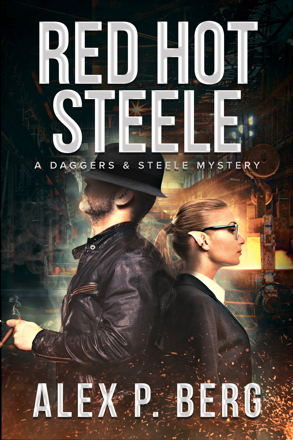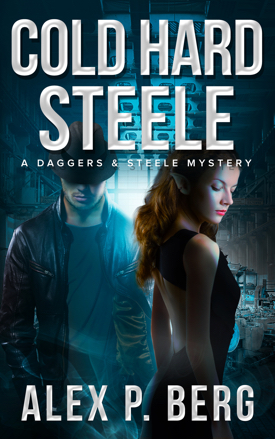As I sit here in late July of 202o, it’s hard for me to believe that I started work on my first Daggers and Steele novel six and a half years ago. Though Red Hot Steele, my first Daggers & Steele novel, wasn’t the first novel I ever wrote, it was nonetheless my second. The series blew up within a month or two of me self-publishing it, and whatever notoriety I have in the urban fantasy and self-publishing sphere is entirely thanks to Daggers & Steele. All in all, the series has sold almost a quarter of a million copies, and fans are continuing to pick it up and read it to this day. With that in mind, and for reasons I’ll soon reveal, I figured it was high time for me to revisit the series, reread all the entires, and give my thoughts on it, six years and so many books later.
First of all, a little background on the series. For those of you who’ve read it, you know the books take place in the fictional city of New Welwic, an urban metropolis filled with all manner of fantastical creatures and with a technological level of advancement of roughly the 1870s (although there are notable quirks, like the fact that guns haven’t been invented, which many fans pointed out to me in online reviews). So why did I create such an odd world to set my story in? Well, for one, because I loved the idea of taking a traditional fantasy world, advancing the technology, and then telling a different kind of story inside it (a murder mystery, specifically). For another, it was because only one author I knew of had told a similar story: Glen Cook in his Garrett, PI series.
Glen Cook is one of my favorite authors, and his Garrett PI novels are some of his best. I’ve read that series multiple times, but I could never find something that scratched the same itch, so I decided to write some novels of my own that were similar. In fact, one online review once compared me to a poor-man’s Glen Cook, and I took that as a compliment.
My other influence in writing Daggers & Steele was the television show Castle. I loved the relationship between Richard Castle and Detective Kate Beckett, and I put a lot of that into Daggers and Steele’s relationship. To be honest, the plots of my first and third novels were inspired by Castle episodes, which at least one internet sleuth realized, but as I went along I grew more and more comfortable in my ability to tell mysteries pulled entirely from the depths of my own mind.
Regardless, when I started the series I was still quite raw as a writer. With a wealth of experience now at my fingertips, I wanted to go back to those early novels and see what I did that excited people so, as well as see the mistakes I’d made. Over the past couple weeks I’ve re-read my first two entries into the series, and here’s what I’ve learned: (Some spoilers will be present, so read at your own peril. And start reading Daggers & Steele if you haven’t!)
Red Hot Steele: Honestly, it was a little hard for me to read this one so many years later. In many places, the writing felt thin to me. I’d accelerate through scenes with very little description or flesh out parts of the story that could’ve been skipped with a simple scene break. The quality of the writing isn’t up to my current expectations, and there were more than a few grammatical errors I had to weed out of the early versions. In some cases, the characters were a little stereotypical, but nonetheless, I can see why people loved the novel, because in my estimation, I did two important things right.
First of all, I created some great characters. While the supporting cast didn’t get fleshed out until later in the series, Daggers is on full display, and boy is he a piece of work. He’s lazy. He’s cocky. He has relationship problems, work problems, self-esteem problems, drinking problems. He’s a giant ball of problems, and quite honestly, he’s a bit of a jerk. But I was able to show enough of why he’s a jerk to make people sympathize with him, and he turns enough of a new leaf to make you think there’s a good guy inside of him who’s worth learning about for nine more novels.
Second: this book oozed style. Writers and editors always talk about style, and boy does Daggers have it. I’m not entirely sure where I pulled him from, but Daggers’ cynical, lazy worldview infused everything in Red Hot Steele, and it made the world around Daggers come to life, even where I failed to fully flesh it out in other ways.
Cold Hard Steele: Now this is a much better overall book than Red Hot Steele. Daggers’ style is still on full display, from the way he gives random nicknames to victims to his jokes and banter, but the world around him has started to come into focus. Steele, as well as fellow detectives Rodgers and Quinto, are starting to have lives, relationships, hopes, and dreams, rather than being there for the purposes of the plot like they were in Red Hot Steele. Steele is really coming into her own, gaining confidence and challenging Daggers intellectually (as well as emotionally, though she doesn’t know it yet). And the plot is quite good! As I said, this one was a fully original idea, and it shows. Somehow I manage to mix werewolves, doppelgängers, writing groups, and frost magic together into a gripping story that wraps up nicely in the end. From a stylistic standpoint, there was still room for me to grow, and I think I used additional murders as too much of a crutch to draw the detectives forward and unearth more clues for them, but overall this was a great second effort and I can see why the folks who made it to the end of book two mostly stuck around for the rest of the series.
As I finish re-reading more books from the series, I’ll post them here in future installments of my retrospective, but before I part: I did mention I’d reveal why I’m talking about Daggers and Steele in general again. Well… let’s just say that while Daggers and Steele aren’t coming back per se, my next project will still feature them, and any fans of the series are sure to be excited for what’s to come.
Until next time,
Alex


